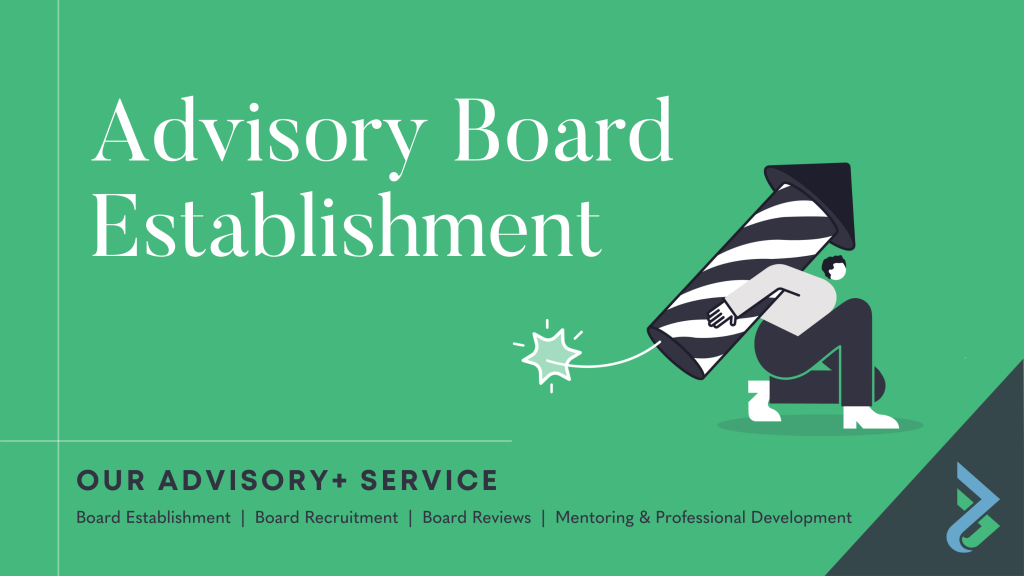
8 Strategies to Build Value with an Advisory Board
Thought Leadership Articles
Published 08 October 2024
An advisory board can be a significant strategic asset for an organisation if it is built on a best practice foundation that encourages the contribution of expertise aligned to the organisation’s strategic priorities.
Maximising the value of an advisory board requires thoughtful planning, clear objectives, and proper engagement. The global growth of the advisory board sector is demonstrating how useful advisory boards within modern governance systems as outlined in the State of the Market Report. With this comes a professional responsibility to do it well to maximise its impact.
This article provides 8 strategies for advisory board professionals and organisations seeking to implement effective thinking systems.
1. Clearly Define the Purpose, Objectives and Roles
- Align the Advisory Board’s Role with Organisational Goals: Before forming or engaging the advisory board, ensure that its purpose aligns with the organisation’s strategic goals. Whether the focus is on market expansion, innovation, industry insights, or overcoming challenges, the advisory board’s objectives should be clearly defined.
- Define the Roles with the Governance System: Clearly articulate the advisory board roles within the overall governance system including the responsibilities of the internal sponsor, advisory board Manager, Chair and members
- Set Specific Expectations: Provide clear guidance on the expectations for advisory board members, including the nature of their contributions, time commitment, and any specific deliverables (such as reports or feedback on particular projects).
2. Recruit Diverse Expertise and Perspectives
- Select Members with Relevant Expertise: Assemble a board with a diverse set of skills and backgrounds that are fit-for-purpose and complement the organisation’s needs. This could include industry leaders, domain experts, market analysts, regulatory specialists, or entrepreneurs with proven track records.
- Promote Diversity in Thought and Background:Diversity of thought, background, and experience helps bring different perspectives to the table, fostering more innovative ideas and better problem-solving.
3. Foster Open Communication and Collaboration
- Encourage Robust, Respectful Discussions: Advisory board meetings should foster an environment where members feel comfortable sharing ideas, challenging assumptions, and offering constructive feedback. This creates a more dynamic and productive relationship between the board and the organisation. The role of the Chair is key to effective facilitation.
- Facilitate Two-Way Dialogue: While the advisory board is there to offer guidance, the organisation should also be proactive in providing updates and relevant information to the board, ensuring they are well-informed about organisational priorities, challenges, and opportunities.
4. Utilise Advisory Board Insights in Decision-Making
- Actively Evaluate Recommendations: Consider how the advisory board’s insights are reviewed and applied to the organisation’s strategic decision-making processes. Showing that their input has a tangible impact motivates board members and reinforces their value to the organisation.
- Provide Access to Key Information: Ensure advisory board members have access to relevant, up-to-date data and resources so they can provide informed advice.
5. Provide Adequate Support and Resources
- Offer Administrative Support: Consider the role of the Advisory Board Manager to provide the advisory board with administrative support, such as meeting coordination, pre-reading, minutes, and follow-up, so that members can focus on providing high-value advice without logistical distractions.
- Focus on Effective Facilitation: Conduct well-structured meetings with clear agendas and expert facilitation. A qualified advisory board chair keeps the advisory board engaged and allows them to stay focused on effective discussions aligned to the advisory board’s purpose.
- Compensate or Recognise Members: Depending on the organisation’s resources and the advisory board’s role, compensation (whether financial, equity, or in-kind) or other forms of recognition can help motivate and attract top talent to the board.
6. Foster Quality Engagement
- Build Strong Relationships Between Board Members and Management: Encourage relationships between the advisory board members and the organisation’s leadership team. Trust and rapport enhance collaboration and make it easier to engage in productive discussions.
- Provide Connection Opportunities: Organisation’s value connection and introduction opportunities from advisory board members. Additionally, advisory board members often appreciate the chance to expand their own networks. Offering opportunities for members to connect with each other and other stakeholders (such as company executives, investors, or key clients) can make their involvement more rewarding.
7. Evaluate and Refine the Board’s Structure and Functioning
- Regularly Assess Board Effectiveness: Periodically evaluate the advisory board’s contributions and alignment to the organisational priorities. This can be done through formal reviews, surveys, or discussions with leadership to determine if the board is meeting its objectives.
- Adjust Board Composition as Needed: As the organisation evolves, the advisory board’s composition may need to be adjusted to align with changing priorities. Recruiting new members with relevant expertise for emerging challenges or opportunities can keep the board fresh and impactful.
8. Promote Accountability
- Set Measurable Goals for the Board: Establish clear, measurable outcomes for the advisory board’s work, such as providing recommendations on specific challenges, identifying new growth opportunities, or helping the organisation build strategic relationships.
- Track the Impact of Their Contributions: Document the results of advisory board interventions and track their contributions to key organisational decisions. This not only demonstrates their value but also provides a way to refine the board’s role over time.
Adopting these practices supports an organisation to ensure that its advisory board contributes effectively, offering valuable guidance and expertise that drive growth, innovation, and long-term success.
Establish an Advisory Board
IMPLEMENT BEST PRACTICE FOR YOUR ORGANISATION
Connect with our Advisory+ Team






